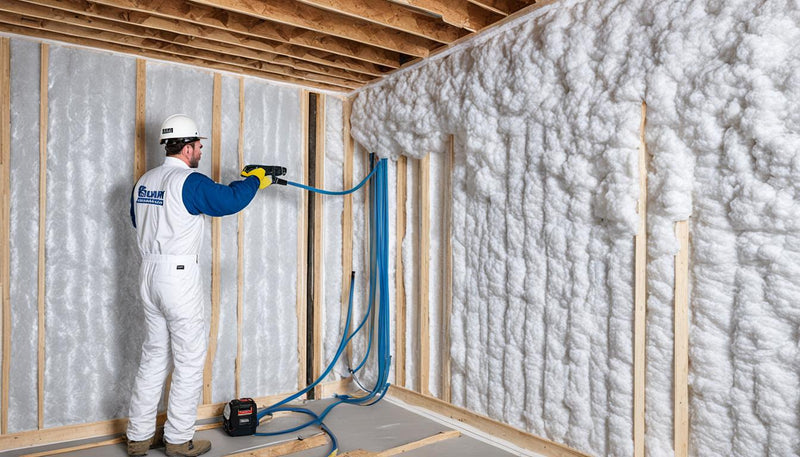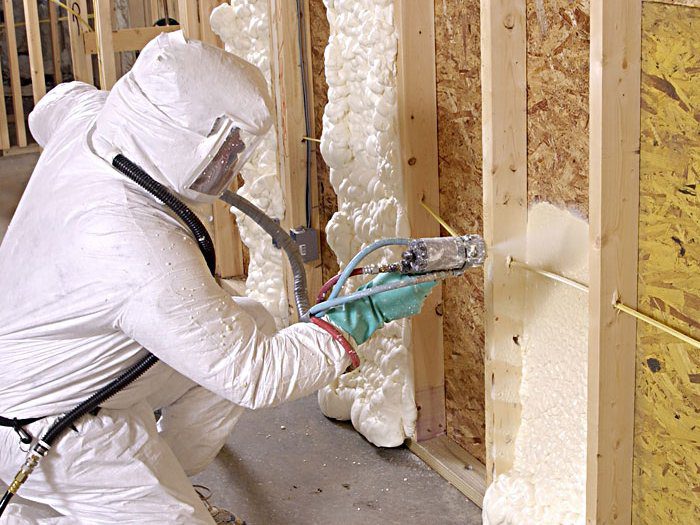Top Applications of Spray Foam for Residential and Commercial Properties
Top Applications of Spray Foam for Residential and Commercial Properties
Blog Article
Spray Foam: The Ultimate Option for Air Sealing and Insulation
Spray foam insulation has actually emerged as a leading option for efficient air securing and thermal insulation, providing a special mix of properties that set it apart from standard methods. Comprehending the full scope of its advantages, installment procedures, and comparisons with various other insulation kinds is important for making notified choices.
What Is Spray Foam?
Spray foam is a versatile insulation product that integrates the principles of air sealing and thermal resistance to boost power efficiency in buildings. Made up mainly of polyurethane or other similar compounds, spray foam is used as a fluid that increases upon contact with surface areas, producing a solid, continual layer of insulation. This distinct residential or commercial property enables it to fill up voids, fractures, and gaps that typical insulation materials may neglect, giving a remarkable air seal.
There are 2 major kinds of spray foam: open-cell and closed-cell. Open-cell spray foam is lighter and more adaptable, supplying outstanding sound absorption and a reduced R-value per inch - Spray Foam. In comparison, closed-cell spray foam is denser, supplying a higher R-value, dampness resistance, and added architectural integrity to building parts
The application process generally entails specialized devices, making certain a seamless application that abides by different substratums, consisting of wood, steel, and concrete. This adaptability makes spray foam ideal for both new building and constructions and retrofitting existing structures. Its capacity to develop an airtight barrier dramatically adds to decreasing energy consumption and boosting interior air high quality, consequently making it a recommended choice amongst homeowners and home builders alike.
Advantages of Spray Foam Insulation
One of one of the most considerable advantages of spray foam insulation is its phenomenal ability to develop a continual air barrier, which efficiently minimizes power loss. Unlike typical insulation materials, spray foam increases to fill gaps and splits, making certain that air leakage is substantially lowered. This characteristic not only boosts energy performance but likewise brings about decrease utility bills in time.
Additionally, spray foam insulation offers exceptional thermal resistance, adding to a more stable indoor environment. Its high R-value per inch allows for efficient insulation in constrained rooms, making it optimal for attics, wall surfaces, and crawl spaces. In addition, the moisture-resistant homes of spray foam help stop mold and mold growth, advertising much healthier living problems.
Another important benefit of spray foam insulation is its sound-dampening high qualities (Spray Foam). It properly decreases sound transmission between rooms, developing a quieter and much more comfy home atmosphere. The longevity of spray foam likewise attracts attention, as it does not droop or resolve with time, keeping its efficiency throughout its life-span
How Spray Foam Works
Recognizing just how spray foam insulation functions is important for appreciating its effectiveness in air sealing and thermal resistance. Spray foam insulation includes two primary parts: isocyanate and polyol resin. When these components are blended, they undertake a chain reaction that creates the product to broaden quickly, developing a thick foam that loads cavities, splits, and spaces.
As the advice foam broadens, it follows surface areas, developing a closed seal that substantially decreases air infiltration. This particular makes spray foam insulation highly effective at avoiding drafts and dampness penetration, which can result in energy loss and damage gradually. In addition, the closed-cell version of spray foam provides remarkable thermal resistance because of its rigid framework, properly lessening heat transfer.
The one-of-a-kind residential properties of spray foam allow it to satisfy irregular surface areas, making certain extensive protection and a seamless barrier. Consequently, spray foam insulation not just improves power effectiveness however also adds to enhanced indoor air top quality by minimizing the build-up of toxins and allergens. Ultimately, comprehending the mechanics behind spray foam emphasizes its function as an exceptional option for insulation and air securing in both industrial and household applications.
Installation Process Review

Before installment, the space should be properly cleaned up and prepped, ensuring that surfaces are without wetness, particles, and dirt. Since pollutants can jeopardize attachment and total efficiency, this action is crucial. Once the area find this is prepared, the application involves mixing both elements of the spray foam, which broadens upon call and loads spaces successfully.
Trained specialists should carry out the installment, utilizing specific equipment to guarantee uniform coverage and optimal density. Safety preventative measures, including wearing protective gear and guaranteeing appropriate air flow, are necessary throughout this procedure. After application, the foam commonly treatments promptly, creating a strong obstacle that improves power performance.
Contrasting Spray Foam to Typical Insulation
When examining insulation alternatives, spray foam insulation attracts attention in contrast to standard materials such as fiberglass and cellulose. Among the key advantages of spray foam is its remarkable air securing capabilities. Unlike fiberglass and cellulose, which can allow air seepage, spray foam expands upon application, filling up spaces and holes to develop an impermeable seal. This results in boosted power effectiveness, as less heated or cooled air leaves the home, bring about reduced utility bills.
In addition, spray foam offers a greater R-value per inch than typical insulation kinds, using even more effective thermal resistance in a thinner profile. This particular is particularly valuable in areas with limited dental caries depth. In addition, spray foam is immune to wetness and mold growth, which can be a substantial problem with cellulose and fiberglass, particularly in moist environments.
Nonetheless, spray foam insulation commonly brings a higher ahead of time cost than its typical counterparts. House owners need to evaluate this preliminary investment versus long-term power savings and performance look these up advantages. Inevitably, while both insulation types offer their objective, spray foam arises as an advanced remedy for contemporary insulation demands, specifically in regards to air sealing and thermal effectiveness.

Final Thought
In summary, spray foam insulation represents a very reliable solution for accomplishing optimal air sealing and thermal resistance. Its special properties, consisting of moisture resistance and sound dampening, make it ideal for different applications in both brand-new building and constructions and retrofitting tasks (Spray Foam). The first expenses may be greater compared to standard insulation materials, the lasting advantages, such as substantial energy cost savings and enhanced interior air top quality, justify the investment and underscore its worth in modern structure techniques.
Spray foam insulation has emerged as a leading remedy for efficient air securing and thermal insulation, supplying an one-of-a-kind mix of properties that establish it apart from typical techniques.Spray foam is a versatile insulation material that integrates the concepts of air sealing and thermal resistance to boost energy performance in structures.When assessing insulation options, spray foam insulation stands out in contrast to standard products such as fiberglass and cellulose. Inevitably, while both insulation kinds offer their objective, spray foam emerges as a more advanced option for modern-day insulation requirements, specifically in terms of air securing and thermal efficiency.
In summary, spray foam insulation stands for an extremely efficient solution for attaining optimum air sealing and thermal resistance.
Report this page